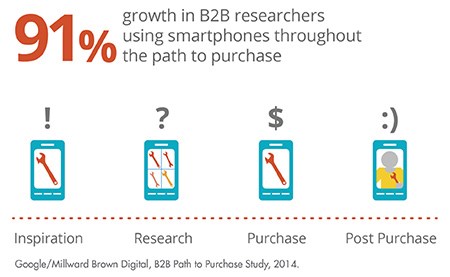Myth versus Fact: Mobile Usage for the B2B Buyer Path is Growing
As the data in this article shows, we use our mobile devices for researching and purchasing B2B products and services. Growing mobile usage and changing mobile search patterns means it’s imperative your website be designed for and work well on all device types. The more user-friendly your website on mobile devices, the more positive impact to your bottom line.

By Dianna Huff
www.twitter.com/diannahuff
Founder and President
Huff Industrial Marketing, Inc.
During a recent web redesign project for a small manufacturer, the client specified exactly how they wanted their user interface to look.
My colleague Rachel Cunliffe, of Cre8d Design, and I work hard to give customers what they want, while also balancing their needs (and project goals and objectives) with myriad web and mobile design elements most people don’t even consider -- nor should they. I mean, who thinks about how electricity works when you turn on a lamp?
So while we both were for presenting the information in a tidy, organized matter, the way the customer wanted it designed wasn’t mobile-friendly. Users accessing the website on smaller devices would run into a glitch.
“It doesn’t matter,” the project team leader replied. “Our customers aren’t accessing our website using mobile.” Mmmmmm . . .
This isn’t the first time I’ve heard this sentiment -- in fact, I hear it all time, especially at the beginning stages of projects when I tell people their website needs to be mobile-friendly.
“No it doesn’t,” someone will say. “Our customers aren’t using their mobile devices to find stuff on our website.”
Actually, that’s not true.
Use of Mobile Research Through the B2B Buyer Path is “Intensifying”
Google partnered with Millward Brown Digital in 2012 to survey 3,000 B2B researchers over a two-year period about their research and purchasing habits and their use of digital.
Almost half, or 42%, of B2B researchers used a mobile device during the B2B purchase process. More importantly, the data showed a 91% increase in growth across the entire B2B purchase path.

Although Google noted only a 6% increase in mobile usage from 2012 to 2014, for those who did use mobile, Google saw a 3x growth rate in mobile search queries.
Other data to note from this study:
- 49% of the researchers who used their mobile devices for product research did so while at work
- Purchase rates on mobile increased 22%
Nearly Half of B2B Decision Makers Are Millennials
In the same study, Google noted that in 2012, the ages of the researchers and buyers were evenly distributed. In 2014, however, a huge shift had occurred in that more than 50% of researchers were 18 - 34 years old -- a 70% increase for this age group in just two years!

Millennials, unlike Boomers or even Gen Xers (the generation from which many of my clients hail) have never known life without the Internet. They’re more than simply familiar with digital and mobile devices -- they’re fluent across multiple digital formats and device types.
This means that if they come to your non-mobile friendly website (or an officially mobile-friendly website that doesn’t quite work on mobile devices), they’ll simply leave. They don’t have the time or the patience to deal with something clunky or poorly designed. Which brings me to my next point . . .
Mobile Users Want Mobile-Friendly Websites
In another Google research study, 74% of consumers stated that when they visited a mobile-friendly website, they were more likely to return to that site in the future.
“But we’re not selling products online,” you may be thinking. Yes, that’s true. But think of all the other things your manufacturing website can do for you:
- Attract younger workers and allow them to apply for a job
- Allow customers to easily find and download documents such as technical or safety datasheets
- Fill out an RFQ form or simply click an email address to shoot off a quick email to you for a quote
- Watch videos or perhaps configure a tool or product
Whether someone is accessing your website from a smartphone or a shop floor laptop, this information has to be accessible and consistent across all devices.
Not Convinced? Look at Your Own Analytics
For many of my small manufacturing clients, mobile search traffic is still very low when compared to desktop – but not non-existent. Figure 1 shows the Sessions (or traffic) data of one client for the period 2016.
It’s easy to look at the 7% mobile usage and conclude, “Our customers aren’t accessing our website via mobile.” Yep, it looks that way. (It could also be that the website isn’t mobile-friendly and therefore is getting less mobile traffic, but for this client, that’s not the case.)

Figure 1: Sessions data for a 1-year period
But, to really understand what's going on, you have to look at the trend over time.
For my clients, I look at mobile usage month-to-month and provide comparison data by quarter, which you can see in Figure 2. For this same client, when comparing the January - March 15 2017 period versus the same period in 2016, mobile usage is actually up 59%!

Figure 2: Comparing the trend over time
Because mobile usage has been inching up over the last six months or so, we’re now tracking conversions, event behaviors (PDF downloads, etc.) and assisted conversions by device. While the mobile numbers are still very low, they will increase as we continue to market the company and its services.
In conclusion . . .
I don’t have to tell you we all rely on our mobile devices for just about everything . . . and as the data in this article shows, this goes for researching and purchasing B2B products and services.
While your own mobile usage data may still be relatively insignificant when compared to desktop, growing mobile usage -- and changing mobile search patterns -- means it’s imperative your website be designed for and work well on all device types.
As Google’s own data shows, the more user-friendly your website on mobile devices, the happier your website visitors -- and the more positive impact to your bottom line.
Need more information?
Dianna Huff
www.twitter.com/diannahuff
Founder and President
Huff Industrial Marketing, Inc.
37 Plaistow Road, Unit 7-245
Plaistow, NH 03865
603-382-8093
Fax: 603-382-1818
www.huffindustrialmarketing.com
.jpg;maxWidth=600)

